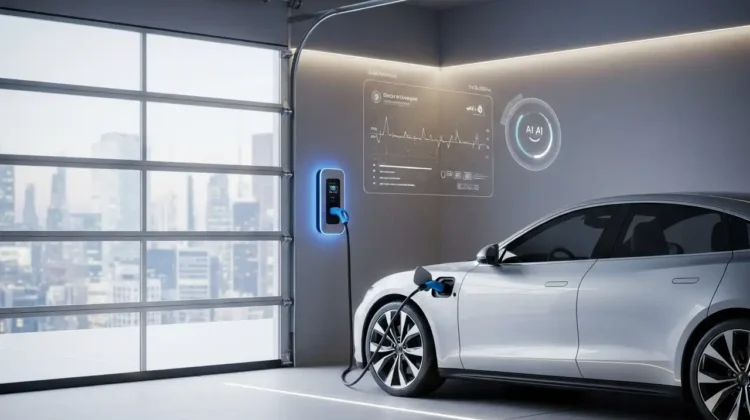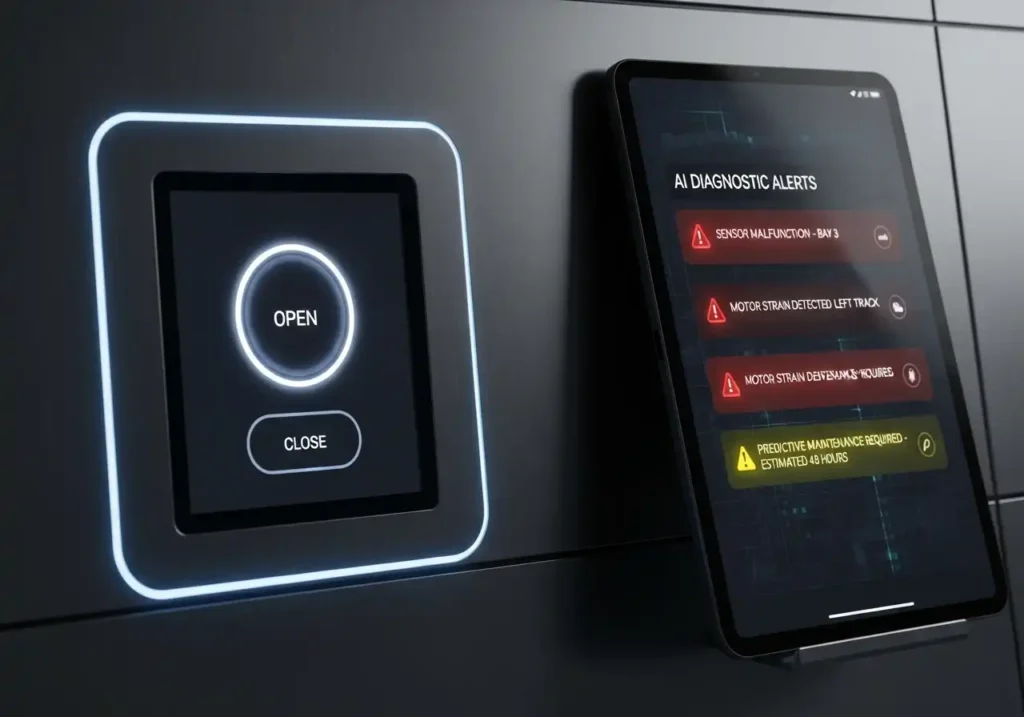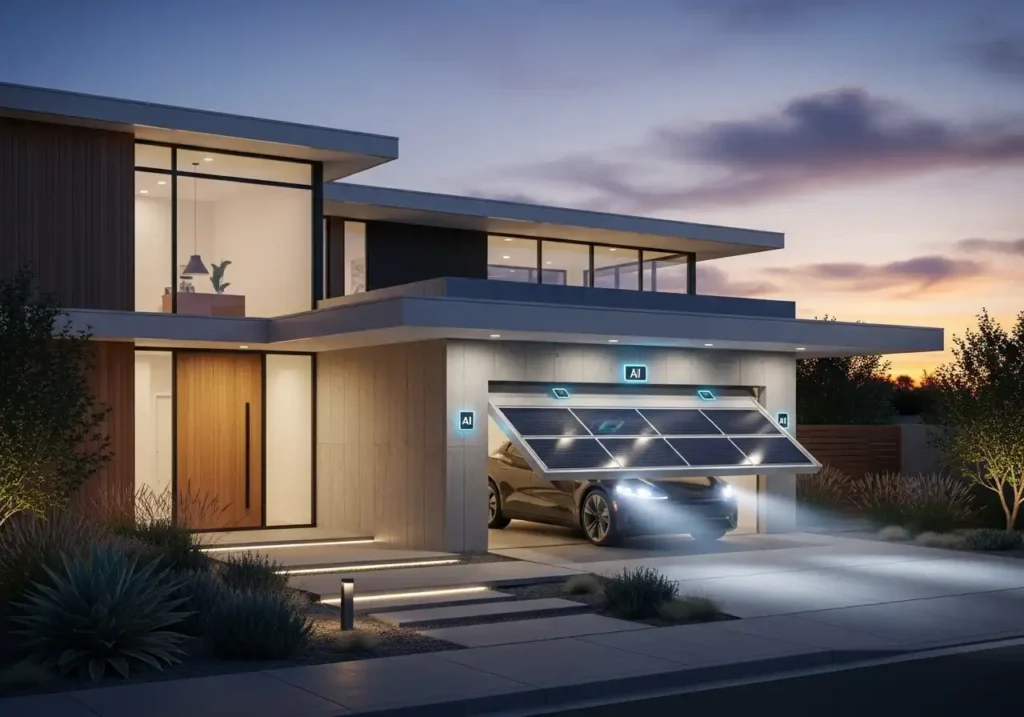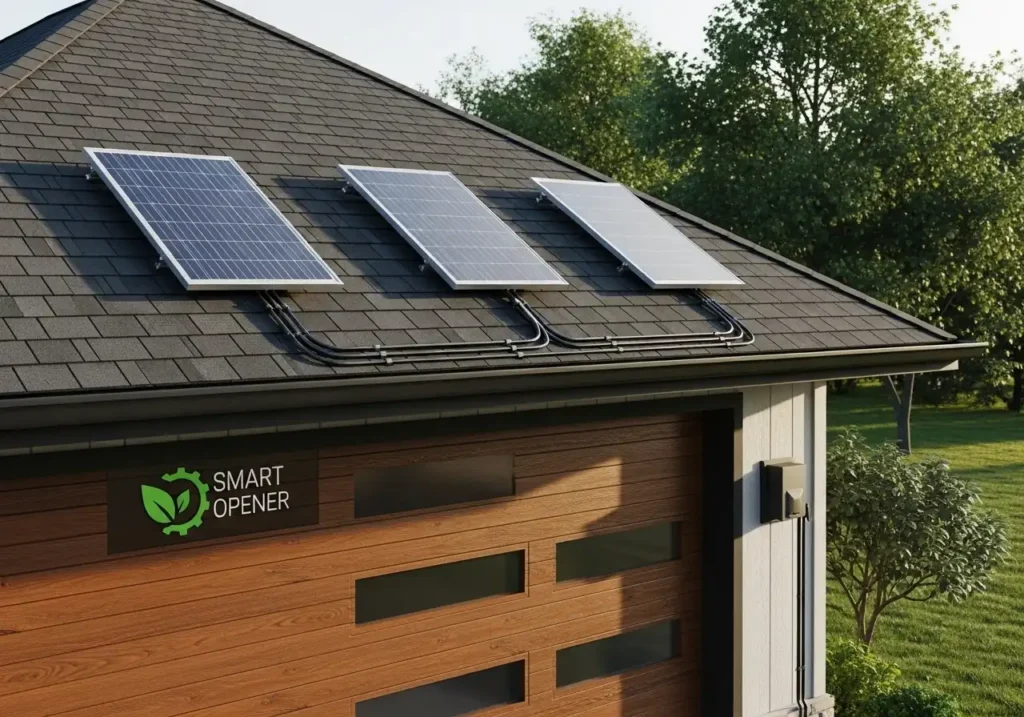
Garage doors have come a long way from simple manual panels to sophisticated smart systems that combine security, energy efficiency, and automation. As we move deeper into 2025, new technologies driven by artificial intelligence (AI) and sustainability are transforming how homeowners interact with their garages. The future of garage door technology promises not only greater convenience but also improved safety, lower energy consumption, and predictive maintenance that keeps your system performing flawlessly.
Smart Homes Demand Smarter Garage Doors
Today’s connected homes rely on seamless automation — and the garage door is no exception. Smart garage doors are becoming an essential part of modern living, offering control from anywhere through smartphone apps or voice assistants. Homeowners can check whether the door is open, receive alerts, and grant temporary access to guests or delivery drivers with a few taps. For a deeper look into smart automation, see our article on how smart garage doors are transforming home security.
The next generation of garage doors goes even further. AI-integrated systems can recognize vehicles, learn your daily schedule, and open automatically as you approach. They can also detect unusual motion patterns or tampering attempts, alerting you in real time. This level of intelligence turns your garage into an active part of your home’s security and energy management ecosystem.
Artificial Intelligence: Predictive Maintenance and Safety

AI-powered garage doors use data analytics and machine learning to detect potential issues before they cause problems. By tracking motor resistance, cycle counts, and component vibration, these systems can predict when springs or rollers are nearing the end of their lifespan. Instead of waiting for a breakdown, the system sends a notification to your phone, recommending a tune-up or part replacement.
This predictive maintenance reduces repair costs and extends the life of your system. It also enhances safety by identifying mechanical stress or balance issues early. For example, if the door’s closing force increases unexpectedly, AI can pause operation and alert you to a possible obstruction. This evolution from reactive to proactive safety will soon become standard across all major garage door brands.
Automation and Hands-Free Operation

Automation is central to the future of garage doors. In 2025, most new systems feature geofencing — a technology that detects your smartphone’s location and opens or closes the garage automatically as you arrive or leave. This eliminates the need for remotes and reduces the risk of leaving the door open accidentally. Furthermore, many models integrate with smart assistants like Alexa, Google Home, and Apple HomeKit for hands-free voice control.
For instance, you can say, “Hey Google, close the garage,” or schedule automatic closing at specific times. Combined with motion detection lights and rolling code technology, these features make daily use effortless and secure. For more about integrated safety mechanisms, visit our post on top garage door safety features.
Energy Efficiency and Sustainability

Sustainability is one of the biggest trends influencing home technology in 2025, and garage doors are no exception. Manufacturers are focusing on energy-efficient insulation, recyclable materials, and low-power motors. Insulated steel, aluminum, and composite doors help stabilize indoor temperatures, reducing the load on your heating and cooling systems. According to the U.S. Department of Energy, well-insulated garage doors can significantly reduce energy loss and improve overall home efficiency.
Some advanced systems even include solar charging panels that power the opener independently. This sustainable approach not only lowers energy bills but also ensures functionality during power outages. Additionally, smart openers with standby modes use less than one watt of electricity when idle, reducing phantom power consumption.
Integration with Electric Vehicles (EVs)
As electric vehicles continue to rise in popularity, garages are evolving into energy management hubs. Modern garage door systems can now communicate with EV chargers to coordinate energy use efficiently. For example, a smart system can delay EV charging until solar panels generate enough power or off-peak electricity rates apply.
In addition, some garage doors integrate with home battery storage units, enabling households to store renewable energy and use it during peak hours. This kind of automation supports sustainability goals while offering greater control over household energy costs.
Enhanced Security Through Smart Integration
Security remains a key focus for garage door innovation. In the past, fixed radio codes made doors vulnerable to hacking. Today, rolling code technology prevents code grabbing by generating a unique signal for every use. The latest models add biometric authentication, such as fingerprint or facial recognition, for even higher security.
AI-enhanced systems can also integrate with home surveillance cameras, sending alerts when unauthorized attempts occur. For example, if motion is detected while you’re away, your system can automatically close the door and lock it remotely. These combined technologies make the garage one of the most secure entry points in modern homes.
Voice and Gesture Control
The way homeowners interact with their garage doors is changing rapidly. Voice control, once a novelty, is now mainstream. Gesture recognition — enabled by radar sensors and AI vision — is emerging as the next wave. Soon, a simple hand motion or a car’s headlight signal could trigger the door to open.
These advancements improve accessibility for individuals with mobility challenges, making garage doors more inclusive and user-friendly. As automation continues to advance, everyday interactions with your garage will feel more natural and effortless.
Eco-Friendly Materials and Manufacturing
Beyond smart features, the garage door industry is adopting sustainable materials and manufacturing processes. Many brands now use recycled aluminum and composite wood made from reclaimed fibers. Paint finishes are shifting toward low-VOC (volatile organic compound) coatings to minimize environmental impact.
Manufacturers are also designing components for easier recycling at the end of their lifespan. For homeowners, this means you can choose doors that not only look beautiful but also support environmental responsibility without sacrificing performance.
AI-Powered Diagnostics and Mobile Alerts
Imagine receiving a phone notification saying, “Your garage door spring tension is decreasing—service recommended.” That’s no longer science fiction. AI-based monitoring apps now track the door’s operation data in real time. If the motor struggles or components show irregular patterns, the system alerts both the homeowner and the service provider.
This proactive approach eliminates unexpected breakdowns and improves overall reliability. As a result, maintenance becomes predictive rather than reactive, saving time and reducing long-term costs.
The Road Ahead: What to Expect Beyond 2025
The next few years will bring even more innovation to the garage door industry. Future models may feature integrated climate control for garages, advanced anti-tamper locks, and carbon-neutral production lines. Some manufacturers are already experimenting with AI assistants capable of scheduling maintenance automatically or contacting technicians when a part nears failure.
In essence, the garage door is evolving from a simple entryway to a connected, intelligent component of your home’s ecosystem. Whether it’s predicting repairs, reducing your carbon footprint, or syncing with your electric vehicle, the future of garage door technology is all about convenience, security, and sustainability.
Final Thoughts
As technology continues to redefine the modern home, the humble garage door is becoming smarter, greener, and more responsive than ever before. AI and automation are transforming it into a proactive safety and energy tool, while sustainable materials ensure it contributes to an eco-friendly lifestyle. Staying ahead of these trends not only enhances your comfort and security but also increases your home’s value in an increasingly connected world.
For ongoing updates about innovations and home efficiency, explore our blog posts on garage door safety features and smart garage doors to stay informed about the latest trends shaping the industry.
